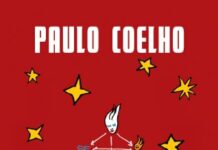
Ebook Info
- Published: 2009
- Number of pages: 403 pages
- Format: Epub
- File Size: 0.55 MB
- Authors: Paulo Coelho
Description
The story is set during the Cannes International Film Festival and the entire action plays out over 24 hours. Igor is a wealthy Russian businessman. His wife Ewa left him two years ago and Igor has never really come to terms with their break up, especially as Ewa is now remarried to a famous fashion designer, Hamid Hussein. Igor is insanely jealous and when Ewa left him he told her that he would destroy ‘whole worlds’ in order to get her back and he intends to keep his promise…
The star-studded film festival acts as a backdrop to a maniacal murder spree and we are introduced to various characters along the way, all of whom are desperately trying to get their big break in the shallow world of show business; Gabriela a young and naive actress who is being exploited by her agent and Jasmine a troubled young Rwandan refugee working as a model.
The Winner Stands Alone is a gripping, fast-paced thriller and Coelho cleverly weaves in elements of social satire, as he pokes fun at our celebrity and money obsessed culture.
User’s Reviews
From Publishers Weekly Coelho’s latest blends spiritual allegory with elements of a thriller and does not lend itself to an easy audio production. Paul Boehmer singlehandedly tackles a cast of characters with a wide spectrum of languages and ethnic identities. The action surrounds 24 fateful hours at the Cannes Film Festival, as Igor kills off members of an elite superclass in a sociopathic rage against his ex-wife, Ewa. Boehmer provides a carefully constructed accent and speech pattern to his portrayal of Igor, and delivers an equally impressive turn as Ewa’s current spouse, a Middle Eastern fashion mogul. Yet other principal figures in the story—particularly the female characters—do not receive the same attention to vocal detail; consequently, the dialogue exchanges sound uneven. A Harper hardcover (Reviews, Feb. 9). (Apr.) Copyright © Reed Business Information, a division of Reed Elsevier Inc. All rights reserved. –This text refers to an alternate kindle_edition edition. From The Washington Post From The Washington Post’s Book World/washingtonpost.com Reviewed by Carolyn See I used to know a guy who hated daylight saving time. Every time it rolled around, he devoted a week to denouncing it, along with corporate greed, artificially fertilized lawns, the American highway system and white bread. When his wife bought a loaf to make the kids’ lunches, he hung it out the kitchen window with a rope. He wouldn’t have it under his roof. I agreed with him on principle. There are plenty of things to dislike about our culture. His best friend hated standard time, for instance. It ate up the hours of honest working men; it was part of a system to line the pockets of electricity executives; it was — like American cars and processed frozen food — a blight on good people everywhere, etc. These guys would have loved Paulo Coelho, although they might wonder about a novelist who deplores glitz and glamour even as he devotes more than 300 pages to evoking glitz and glamour in all its distasteful excess. Coelho takes for his subject here the Cannes Film Festival, which, in his opinion, stands on very shaky moral ground. “In Cannes,” an assistant remarks, “there’s no such thing as friends, only self-interest. There are no human beings, just crazy machines who mow down everything in their path in order to get where they want or else end up plowing into a lamppost.” Coelho disapproves mightily of the human folly on display in Cannes: the unbridled ambition, the thirst for fame, the lure of haute couture and ostentatious jewelry. He hates dark glasses, because “in a celebrity town like Cannes, [they] are synonymous with status,” and he loathes cellphones, which are “leading the world into a state of utter madness.” He posits a small group of people whom he dubs the “superclass,” who have all the power, all the limos, all the private jets; those who dress in high fashion (the fashion world is one of his principal bugaboos), swill champagne, drive Maybachs (the finest car) and who, if they’re women, get regular injections of Botox. But he isn’t fond of ordinary people either, who do silly things like wear neckties or eat three meals a day whether they’re hungry or not. In short, while he compares Cannes to Sodom and Gomorrah, he’s not prepared to let sinners of any social class off the hook, quoting Solomon’s “Vanity of vanities, all is vanity” more than once and apparently meaning it. So. Igor, a psychotic Russian phone executive with his own private jet, comes to the film festival in pursuit of his ex-wife, Ewa, who has run off with Hamid, an Arab clothes designer also with his own private jet. Igor aims to kill a few people and notify Ewa on her cellphone, hoping this will motivate her to return to him. Over a period of about 24 hours, he does indeed manage to suffocate a young street vendor using the Russian martial art Sambo and off an important movie distributor using a needle soaked in curare, which Igor blows through a cocktail straw — this at a crowded lunch party on the beach. He spends the afternoon stabbing an independent film director and leaving a hermetically sealed envelope filled with hydrogen cyanide under an unknown person’s door. Several unsuspecting women move through this corrupt and glittering landscape: a 25-year-old model who yearns for a chance at the big time, a 19-year-old model from Africa and that murdered director who has spent her entire adult life making a film for which she seeks distribution. Through them, the author visits the worlds of moviemaking. (Will it surprise many readers to learn that the writer is the least well-paid participant in any project?) And we are told that Los Angeles is “really a large suburb in search of a city.” The world of fashion is also held up to scrutiny — its sins too numerous to mention. Yes, we do live in a sinful world where all is vanity. I’d be a fool to disagree; it would be like coming out in support of processed cheese or puppy mills. But note that at the Cannes Film Festival in 2008 Harvey Weinstein bought the rights to Coelho’s best-selling “The Alchemist” and will be producing it with a budget of $60 million. I imagine that Coelho was around there somewhere in that modern Sodom, probably wearing dark glasses because it gets pretty bright at the beach, and maybe even talking into a cellphone. It’s the human condition, after all — all that vanity — and if you can refrain from blowing curare-soaked needles into the backs of people’s necks, it isn’t all that bad. Copyright 2009, The Washington Post. All Rights Reserved. –This text refers to an alternate kindle_edition edition. Review “[This] Brazilian wizard makes books disappear from stores.” (New York Times )“[Coelho’s] special talent seems to be his ability to speak to everyone at once. The kind of spirituality he espouses is to all comers. . . . His readers often say that they see their own lives in his own books.” (The New Yorker )“[Coelho’s] special talent seems to be his ability to speak to everyone at once. . . . His readers often say that they see their own lives in his own books.” (The New Yorker ) –This text refers to an alternate kindle_edition edition.
Reviews from Amazon users, collected at the time the book is getting published on UniedVRG. It can be related to shiping or paper quality instead of the book content:
⭐ I like Paulo Coelho. I read a couple of his books and definitely felt his point about life. The Alchemist is definitely a favorite. This book was good and pretty much talks about the price of getting what you really want or think you want. He does a good job in the characters and seeing what their true goals are. How some got to the pinnacle of what they wanted and found the prize or price wasn’t worth it. There are definitely lessons in this book. I don’t think it was the best book of his I have read but I did gain some good insights from it.
⭐ Coelho’s The Winner Stands Alone is the most graphic and revealing portrait of our particular era’s pathology — everyone in one way or the other is infected with the ‘rich and famous’ syndrome. Igor exemplifies the dishonesty and false ideals by killing for ‘love’. He feels justified in looking down on all the tiers of celebrity mania — from those who come to worship from a distance to those who aspire for a place in the ranks at the cost of any personal sacrifice, to those who are drawn into celebrity industries (models, actors, designers, agents, producers, et al.) to those who have reached one pinnacle or another and only congregate with other superclass members, to the endless tiers of marketers ‘placing’ their products, ad nauseam. (FYI: In a Sopranos episode in which Christopher goes to a Hollywood event and mugs Lauren Bacall for her bag of free designer goodies, the insanity of this culture is made crystal clear.) The Garden of Earthly Delights has been reduced to the lowest common denominator — make money or be famous or die. Even Igor’s love is just an expression of his egomania. I personally could not put this book down.
⭐ Coelho is a master writer, no question there, but for me his best works are still “The Alchemist” and “Devil and Ms Prym”. The narrative in those two novels is by far the best developed. I wept by the river Piedra while I read the book with the same title, I didn’t “get” the witch book named after a mushroom, I liked “Zahir” but felt it was overdone. “The Manual” is excellent and his collections of short wisdoms are just brilliant.With “Winner stands alone”, Coelho entered a new realm, usually covered by heavyweights like Umberto Eco, in which novel is made of bits and pieces of popular culture, celebrity, news, cultural theory and documentary-like material which binds the narrative. It is all a good read, but Igor is a bit overdone, from the point when he does his first “kung fu” move. I have seen (read) something like that only in Bruce Lee movies. Nice touch, but a little out of place and reads like a dead blonde that falls out of a trunk just when needed to rescue a dysfunctional part of the story. If I rated this book based on “The Alchemist”, it would get no more than two stars.However, in the sea of poorly written books, Coelho’s works are a treat and each one deserves five stars. Don’t miss it. For the real thing, however, cultural criticism, you have to pick up Umberto Eco’s works (essays in particular).
⭐ I love Paulo Coelho books and I have read most of them. I think this is my least favorite. I have found it hard to get absorbed into the story. I’m not particularly interested in the characters and I am a little bored. The only reason I finished the book is because the author is Pauli Coelho. Any other author and I would have not finished it.
⭐ Riveting plot line and mystery with excellent character development. Entertaining and with a bold message about human nature and the things that push people to their limits.
⭐ Not Coelho’s best work. It’s a lot more pessimistic than a lot of his work. Character development was certain far more detailed than Coelho usually gets, which is a plus, but the story’s resolution leaves you wanting more.
⭐ thanks
⭐ Very different style than your typical Coelho, but similar in structure: characters who go off looking for what they want, but realize they went d or got something else entirely.
⭐ good
⭐ good
Keywords
Free Download The Winner Stands Alone in Epub format
The Winner Stands Alone Epub Free Download
Download The Winner Stands Alone 2009 Epub Free
The Winner Stands Alone 2009 Epub Free Download
Download The Winner Stands Alone Epub
Free Download Ebook The Winner Stands Alone





